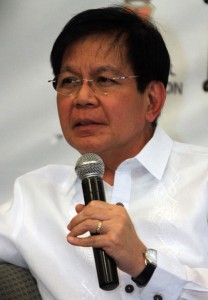Top PH firms to help in ‘Yolanda’ rehab

MANILA, Philippines—The country’s top 30 corporations have signed up to help the government rebuild cities, municipalities and villages from the ruins of Supertyhoon “Yolanda,” rehabilitation czar Panfilo Lacson said on Sunday.
Beyond pledges of cash, the companies want to build homes and create livelihood for close to 800,000 families displaced by the powerful storm that leveled most of the Visayas on Nov. 8, Lacson said.
“There are no strings attached here,” the former senator said in an interview with radio station dzBB. He said he had sat down with some CEOs and country representatives of international aid and funding agencies in recent weeks to discuss the rehabilitation program.
They merely hoped to turn this into a business opportunity later, Lacson said. If at all, their only request in any project is that their funds should not be commingled with the government’s, he added.
Sponsors
Lacson declined to name the corporations which had already agreed to help, saying he was still looking for sponsors of other ravaged areas.
“So far, four areas have been identified and two big companies have volunteered to take care of their rehabilitation,” he said.
Faced with its worst yet disaster in three years, the Aquino administration is crafting a massive post-Yolanda relief, rehabilitation and reconstruction plan that could run up to P130 billion.
The storm spawned a lethal combination of heavy rain, strong gusts and storm surges that flattened mostly seaside villages in the Visayas, leaving more than 6,000 dead and at least P30 billion in damage to crops and infrastructure.
A month after the tragedy, President Aquino plucked Lacson from his retirement from the Senate to oversee the massive rehabilitation of ground zero—specifically Tacloban City—that, officials say, could take years.
Lacson, a former Philippine National Police chief, wasted no time in tackling his job. He had flown to Leyte and Samar to survey the extent of damage.
Even as rumors of his appointment swirled, Lacson had sat down with officials of the Japan International Coordinating Agency, the United Nations Development Program, and other agencies, as well as with the CEOs to get their perspectives on the tough task at hand, if not their commitment.
Sustained help
Most of the CEOs sought him out to discuss how they could help, he said.
After talking in small groups, the chief executives of the companies will hold a big meeting in early January to draw up a concrete plan for the rehabilitation of specific areas, according to Lacson. “This is a session where they will commit to provide sustained help to the government,” he said.
So far, what has emerged in his conversations with the CEOs is the idea of adopting an area for rehabilitation either geographically or sectorally, the rehabilitation czar said.
And since the government is in charge of rebuilding public buildings and rehabilitating crops and fisheries, the companies will invest in the construction of homes and livelihood creation, Lacson said.
They could build schools if they wish to, he added.
“This is really donation; humanitarian in nature,” Lacson said. “They just want clear guidelines from the government where they will come in.”
No commingling of funds
The CEOs have put on the table one major request: no commingling of funds with the government’s, Lacon said. Hence, their projects would be clearly “delineated,” he added.
If there’s anything they could gain from it, it could be a “potential business” in the area of rehabilitation, but the priority is rehabilitation, he said.
Lacson said it was better that he didn’t hold the funds. And to stay focused on the job, he resolved to be “color blind” to the political affiliations of local officials he has to deal with.
The memorandum order issued by the President didn’t vest Lacson with powers to run after violators of the law, but the former senator said he wasn’t disheartened.
Lacson said he would be “happy” if 85 to 90 percent of these areas were rehabilitated at the end of the day despite budget and time constraints.
RELATED STORIES:
BIR chief: It’s OK to tap private sector in rehab efforts
Lacson hits the ground running with first Cabinet meeting
